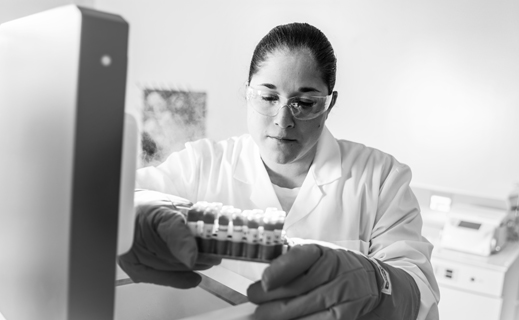Catarina Flyborg is the general manager of Cytiva's Cell and Gene Therapy division. Her goal is to provide end-to-end flexible technology solutions that enable customers and partners to launch and deliver important new therapies for patients. Learn more from Catarina and her team at the BIO International Convention, June 3 to 6, 2019, in Philadelphia, booth # 3519. If you would like to schedule an in-person meeting at BIO, please submit your request on our event page.
It excites me to think about what the future holds for healthcare—from where a person’s health record will reside to how diseases will be treated. Technology—mobile, social, and cloud—has created a paradigm shift in healthcare. Patients may soon have access to their health information via their phones and will be collecting and sharing their data. The wealth of information about diseases and associated genes now available through public databases will drive improvements in diagnosis and guide treatment. Through the collection of real-time information, drug companies will gain a better understanding of what treatments affect specific patients; how they can optimize efficacy of therapies and minimize side effects; and how to improve clinical trial design. Improvements to equipment and digital advancements will modernize drug manufacturing.
Patients have already begun to be treated with their own cells—albeit cells that have been removed, optimized at a biopharma manufacturing site, and returned to the body—in order to replace, repopulate, or reset the body’s own immune system. These new cell therapies have the potential to transform how we treat and potentially cure once life-threatening diseases.
Industry collaboration is critical
As promising as cell therapies are, they also bring manufacturing and logistical complexities. Making these medicines depends on a tightly controlled processes that start and end with the patient and involves his/her doctors, diagnostics and treatment center, biopharma manufacturing site, and transportation services. Throughout this complex process, the cells must be protected against operator error and contamination to ensure the cellular treatment is safe and originated from the person receiving treatment. If not closely managed, the smallest variation in a rigorously defined process can impact the viability of the therapy and render it unsafe for the patient.
Fig 1. We believe in the promise of cell and gene therapies and support the growing combination of technologies and experience. Learn about the latest cell and gene therapy developments.
A more "industrialized" approach is needed to overcome these challenges. This will mean standardizing manufacturing workflows and equipment to manage the complexities in making and delivering cellular therapies. It also means tapping the vast resources and combining the expertise of industry partners across the healthcare delivery system. I believe our collective experience dealing with sensitive biological therapies can be leveraged to help bring cell therapies to the market efficiently, with reduced risk, and ensure supply chain excellence.
Consider scalability and automation from the beginning
Decisions made early in research will impact the entire product life cycle, so it is important to consider what facilities, equipment, staff, raw materials, and transportation will be necessary to ensure fast and safe delivery of cellular therapeutics to as many patients as possible. Engineering workflows with an eye toward commercial scale will drive efficiency, consistency, and, ultimately, the treatment’s cost.
Closed processing systems will not only minimize operators’ hands-on tasks, which could introduce product-to-product variability or contamination, but also improve manufacturing efficiency. Layering on advanced digital technologies will add flexibility, efficiency and confidence. It’s not always financially possible to invest in a commercially viable, fully automated and digitized manufacturing system at the start. It’s helpful to work with a biopharma-savvy supplier that understands and provides solutions for every phase of drug development -from research to clinical trials to commercial launch. This will help reduce the expense and time required to change from research-grade materials and equipment to GMP-compliant systems as clinical trials begin. It will also assure consistency and comparability in product quality and analytical test methods through R&D stages and simplify the transfer of processes to additional processing centers.
Cell therapies contain live cells, which greatly complicates the process of transporting these treatments. The degree to which time, temperature, and handling impacts the therapy’s activity influences logistical decisions. Industry partners accustomed to transporting sensitive biologics can draw on their experiences to help design reliable solutions to safely transition from cell collection to processing to patient delivery.
